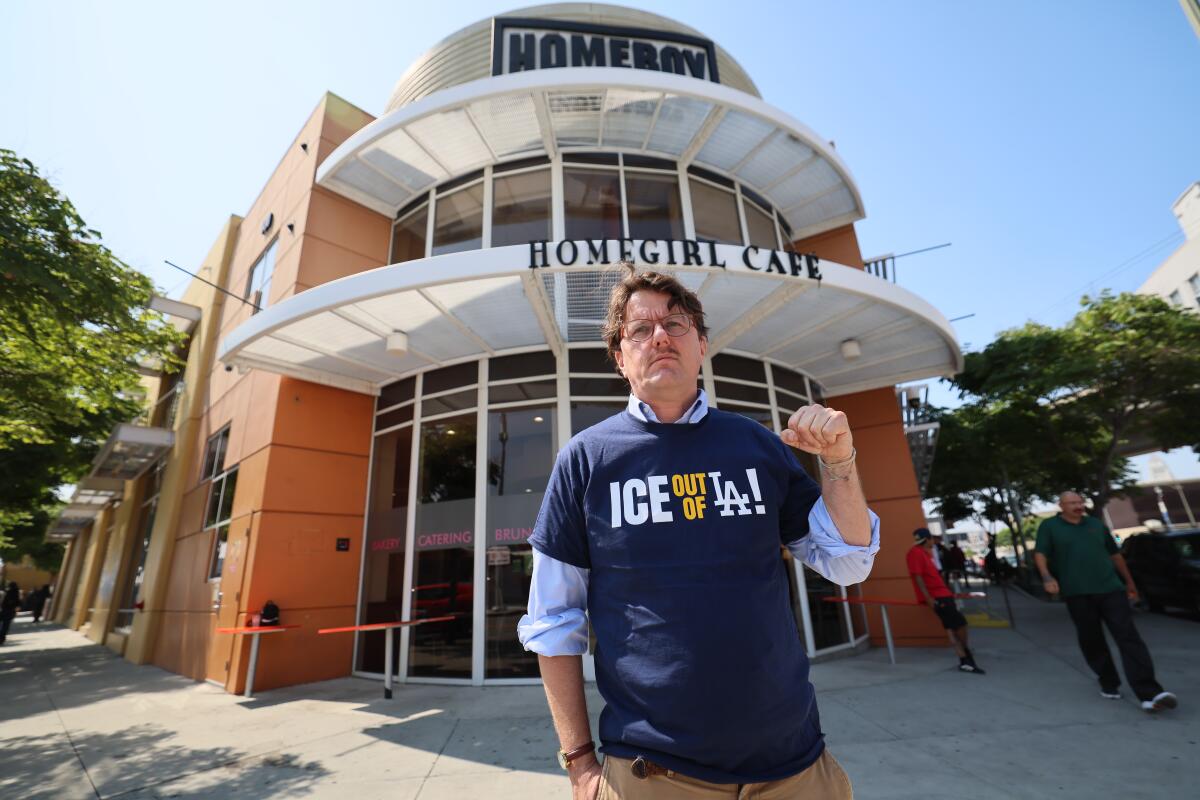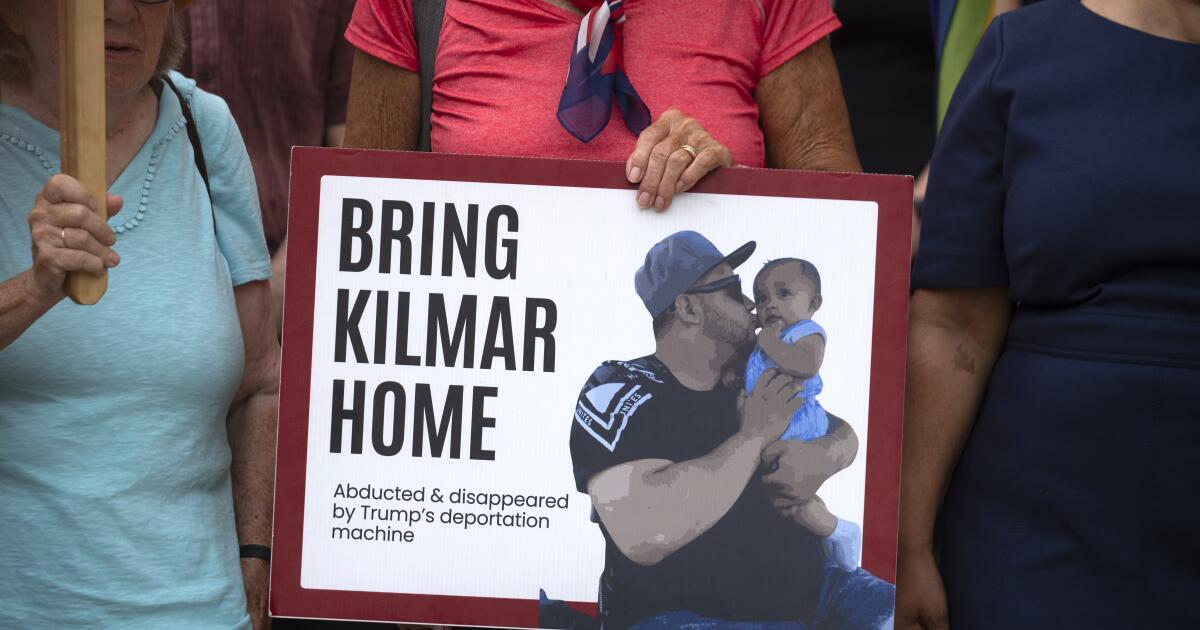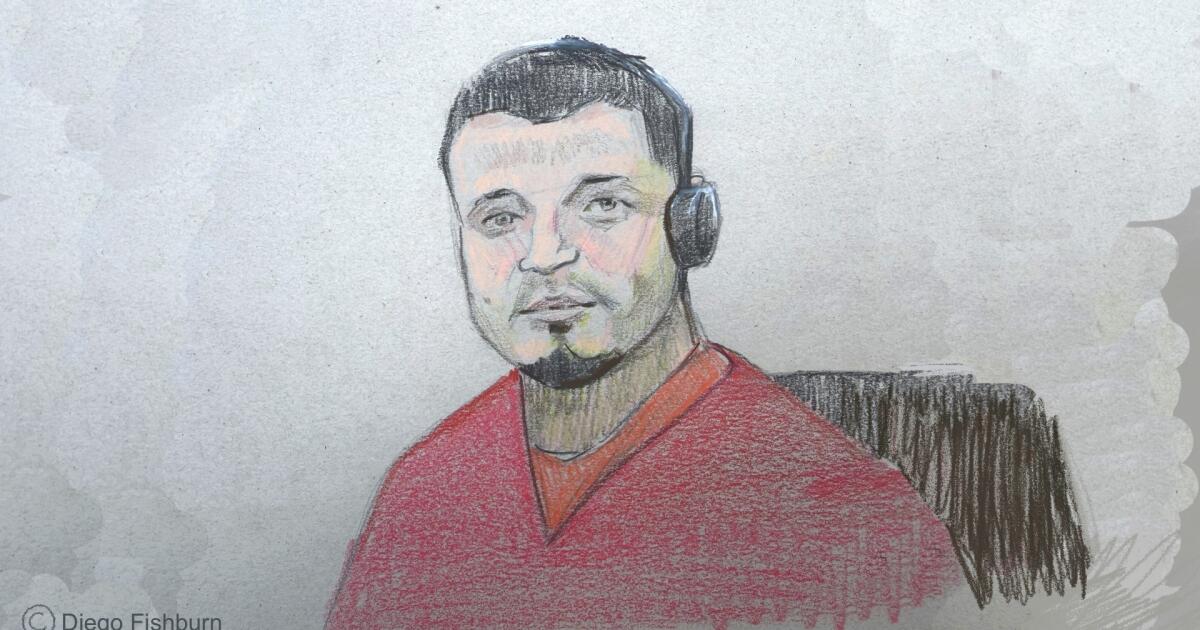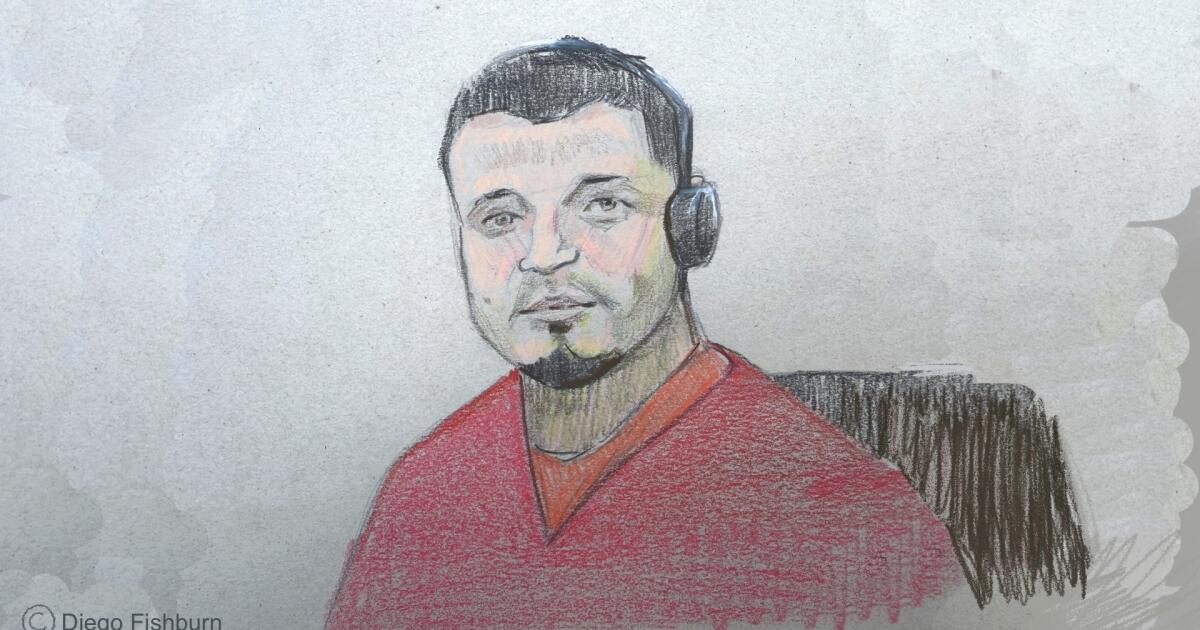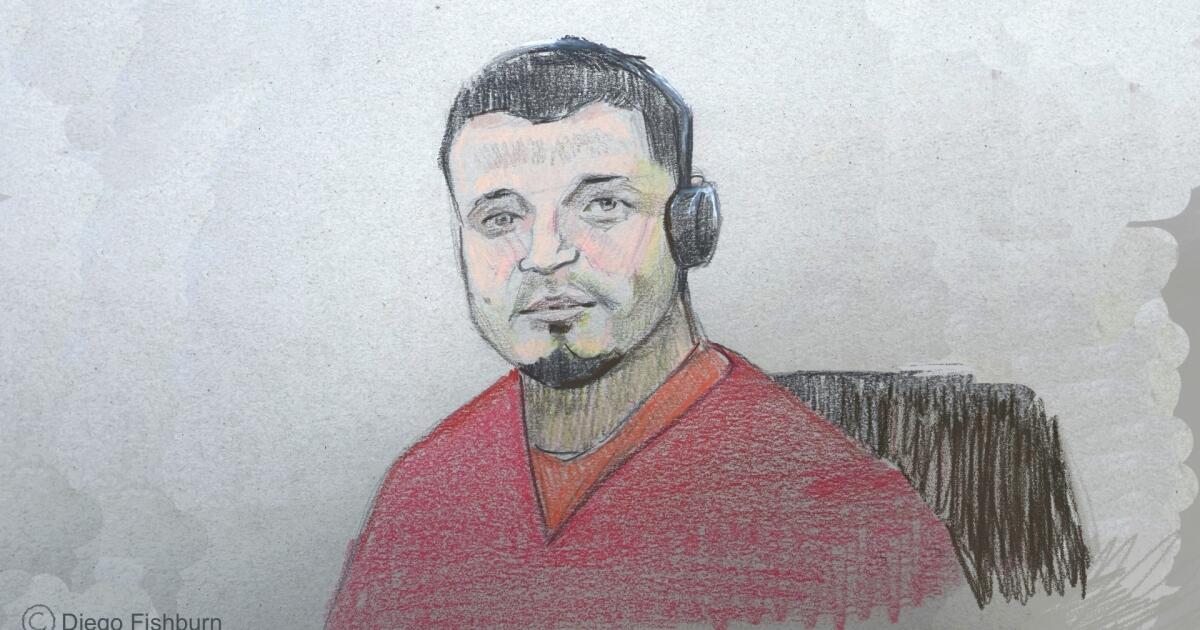Chris Newman is at the center of the immigration fight — again
Chris Newman was carrying two bags when we recently sat down for breakfast at Homegirl Café in downtown Los Angeles.
One was a newish satchel holding his laptop and papers for the cases he’s working on, which happen to involve some of the most infamous moments in the Trump administration’s deportation deluge.
Newman assisted on a lawsuit that won a temporary restraining order against the indiscriminate immigration raids that have afflicted Southern California since June. He also represents the family of Kilmar Abrego Garcia, a day laborer who was mistakenly deported to his native El Salvador in the spring, then returned on the order of a federal judge. At the Border Patrol’s takeover of MacArthur Park earlier this month, Newman was there shooting video and deriding the spectacle as “a dystopian episode of ‘The Apprentice.’”
“If we can litigate the calamity [of Trump] at the local level to the widest degree, that can help democracy survive, dude,” Newman told me as he picked at black beans and two eggs over easy.
The other bag, a big straw tote, was filled with anti-Trump and anti-migra T-shirts, posters and stickers. Wherever Newman goes these days, he hands them out like a progressive Santa Claus.
“I want to keep the proper amount of anger to have the fuel to do all this,” he said. “The pendulum is sweeping so wide and so fast. We need to be ready.”
For the past 21 years, Newman has been a pivotal, omnipresent part of Southern California’s immigrant rights movement as legal director for the National Day Laborer Organizing Network, better known as NDLON. His work takes him from street corners advising jornaleros about their rights to my alma mater, UCLA, where he’s on the faculty of the Institute for Research on Labor and Employment.
Newman’s influence extends far past Los Angeles, however. He’s a regular presence on national media outlets, quick and eloquent with insights and righteous anger. Politicians from Sacramento to Washington know he isn’t afraid to tear into them if he thinks they’re too timid to publicly call out xenophobia or support laws that protect the undocumented.
“He does not mind being the bad cop,” said Angela Chan, assistant chief attorney at the San Francisco public defender’s office. In her previous job last decade, she and Newman helped craft a trio of bills that made California a sanctuary state.
“It can make a meeting very uncomfortable, but Chris is cutting all the bulls— so you get much closer to having an honest conversation,” Chan said. “He does not expect or pursue pomp or circumstance.”
Chris Newman, legal council for the National Day Laborer Organizing Network, outside Homegirl Cafe in Los Angeles.
(Allen J. Schaben / Los Angeles Times)
Salvador Reza, a longtime organizer in Phoenix, first worked with Newman in the mid-2000s after asking NDLON to help pressure the city to let day laborers seek work. Newman participated in forums, organized rallies and ultimately convinced city officials to lay off by citing a 2006 lawsuit against Redondo Beach that he had worked on. In that case, an ordinance banning day laborers was ruled unconstitutional.
Newman and Reza went on to wage many successful campaigns in Arizona, from defeating Maricopa County Sheriff Joe Arpaio at the ballot box to fighting local law enforcement agencies partnering with Immigration and Customs Enforcement. The two even convinced music legends like Zack de la Rocha, Los Tigres del Norte and the late Jenni Rivera to bypass the Copper State during their tours in 2010 to protest a state bill that sought to make life miserable for undocumented immigrants.
“He cares a lot about people, and he’ll go out of his way to help out anyone who needs it who’s being abused by the system,” said Reza, who saw Newman earlier this year when the two met with Home Depot managers over allegations that their stores in Phoenix were chasing off day laborers. “He’s super busy over there in California right now, isn’t he?”
A fast talker who exudes confidence but isn’t a braggart, Newman looks far younger than 49. His full head of hair, round-framed glasses and freshly sprouted mustache gives the Chicagoland native the look of a Depression-era do-gooder.
“I’m trying to hold onto the anger stage so I don’t get into the sad stage,” he said. “And I don’t want to get there because that’ll lead to the acceptance stage, and too much of L.A. is already there.”
Newman never planned for a career like this, even though his mother was from Denmark, his father is a Hungarian Jew and his brother is of Salvadoran descent. He attended law school in Denver, set on becoming a death penalty lawyer, until realizing “it wasn’t like I thought it was in the movies.”
A mentor suggested that Newman recharge his bleeding heart by volunteering with Minsun Ji, founder of Denver’s first day laborers’ center. “I didn’t even know day laborers were a thing,” Newman admitted. But he immediately “loved everything — just hanging out there, chewing the fat and hearing the stories of the jornaleros.”
Ji assigned him to help clean the restrooms his first few weeks. Newman eventually graduated to handling wage theft cases and volunteered for whatever was needed, including driving a van full of day laborers to an NDLON conference in suburban Maryland in 2002. There, he heard Thomas Saenz, an attorney for the Mexican American Legal Defense and Educational Fund who led a successful lawsuit against Prop. 187, the 1994 California anti-immigrant ballot initiative. Saenz told the crowd about MALDEF’s lawsuits against Southern California cities that were trying to ban day laborers.
“That’s when I realized I could use my law degree to do the exact same thing,” Newman said. “[It was] something that I loved in theory, but I didn’t realize it was happening in real life.”
About a year later, he called NDLON co-founder Pablo Alvarado.
“It was at eight at night, and I was still at the [NDLON] office,” Alvarado said in a phone interview. “And Chris said, ‘I want to do a fellowship with you. The fellowship deadline is at three in the afternoon the next day. Can I go right now so we can write it?’”
He began to laugh. “We didn’t sleep all night, but we did it — we finished his application. And Chris never left.”
(Newman remembers the moment differently. He said he applied for the fellowship, but Alvarado forgot about it until the day before it was due.)
Twenty-one years later, Alvarado says Newman’s energy and verisimilitude haven’t changed.
“Even though he’s a lawyer, his feet are on the ground — he’s not an elitist. By 8 in the morning, he will have read every article written that day about immigration. He’ll tell me what we need to do, and then he goes out and does it.”
Like the Abrego Garcia case.
Newman called Abrego Garcia’s lawyer to offer help, then connected with the family to organize a GoFundMe campaign through NDLON. Next was enlisting artists in a social media campaign to make Abrego Garcia’s predicament go viral. Soon, Newman was on a flight to El Salvador in an unsuccessful bid to visit the imprisoned Abrego Garcia, something he would try two more times.
“It felt like a Venn diagram of everything I’ve worked for over the past 20 years,” said Newman, who has yet to speak to Abrego Garcia. “At the time, we had no idea whether he was innocent or guilty. What mattered is that he deserved due process.”
Soon after Newman’s last visit to El Salvador, L.A.’s summer of deportation raids began.
Chris Newman, right, hands Veronica Wyninger, a trainee-employee, a sign at Homegirl Cafe.
(Allen J. Schaben / Los Angeles Times)
I concluded our breakfast by asking if Newman was optimistic that things might get better. Instead of cowering under Trump’s boot, L.A. has stood up. The day we met, the Pentagon announced that half of the 4,000 National Guard members deployed in Southern California in the wake of anti-ICE protests would leave.
“I’m a Cornel West disciple,” Newman responded. “And he said there’s a difference between hope and optimism.”
West defined optimism as based on a rational analysis of what’s out there, while hope is an act of courage against what seems like impossible odds.
“No one has ever accused me of being an optimist,” Newman said.
He kept thinking about it.
“I don’t know, but I think the tide will turn. I remember when Arpaio had an 85% approval rating. And he went down.”
He got more animated. “I know people can turn the tide, but they have to do their part.”
He reached into his straw tote and brought out his anti-migra swag — a T-shirt emblazoned with “Arrest Trump, Not Migrants,” bumper stickers reading “ICE Out of LA!” with the “LA” in Dodgers style, red-and-white signs declaring “I.C.E. Off My Property Get A Warrant!”
Our waitress came with the bill, then looked at the T-shirt. “That’s really cool!” she exclaimed.
“Want it?” Newman replied as he handed it to her. Other Homegirl staffers grabbed stickers and signs.
As we exited the cafe, Newman left a stack on a table next to the door.
“I’m going to go to Highland Park later to ask businesses if they want to post them on their windows,” he said as a customer eyed the signs.
“Go ahead and take it, man,” Newman urged. “Take a bunch!”
